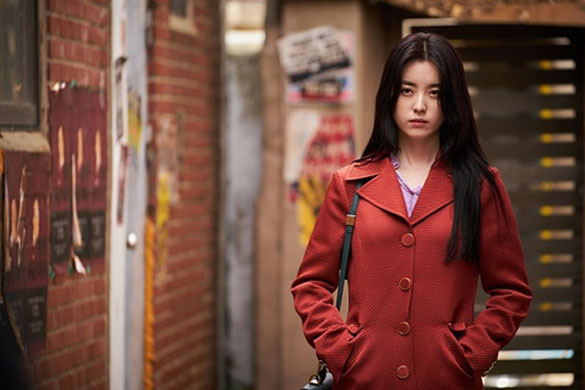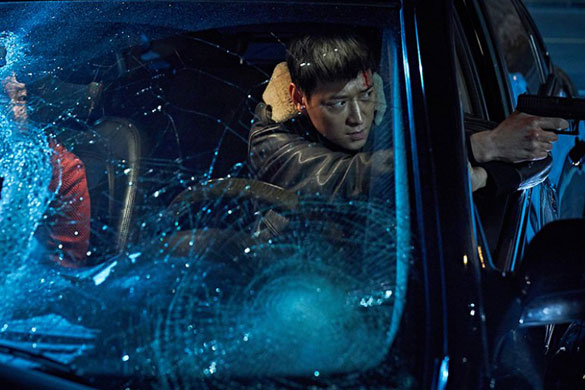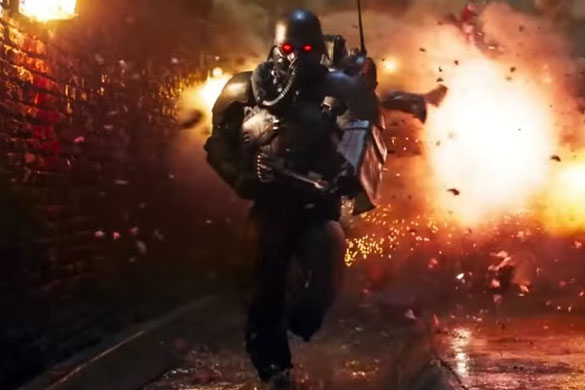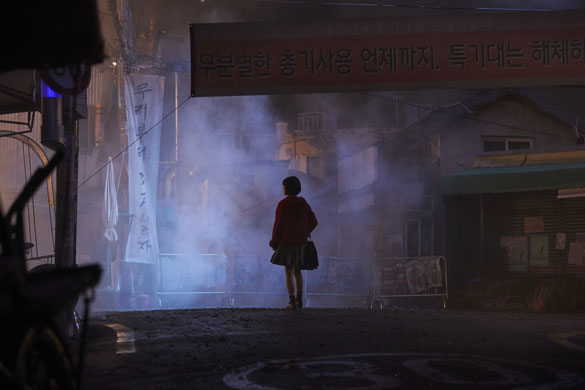"You know the fairy tale 'Little Red Riding Hood'? I saw the story as a puppet show once, it was really odd.
It had a different ending. It ended with the wolf eating the little girl. Cruel, huh?...
But who's to blame for the girl's death? The starving wolf; the grandmother who let the wolf in; or the mother who sent the girl?
Who should we hate? That's the worst thing... we don't know whom to hate..."
Synopsis:
In a dystopian near-future, political turmoil, territorial disputes and increased militarisation engulfs East Asia, directly and adversely affecting both North and South Korea. In a desperate bid to regain power on the world stage, North and South set out a five-year plan to reunify, bringing instant opposition and indeed sanctions both from neighbouring countries and international superpowers led by the US and Russia.
The Korean economy continuing to plummet soon brings domestic unrest bordering on chaos to the Peninsula and ultimately leads to the emergence of the Sect, a terrorist group opposed to reunification that uses young, often underage, bomb-runners in its efforts to cause as much widespread mayhem and destruction as possible. A highly trained police Special Unit is launched to counter this terrorist threat but the mistaken killing of 15 innocent, unarmed schoolgirls on a day soon known as 'Bloody Friday' calls its entire existence into question, leading to Special Unit operatives hiding their identities behind nightmarish face and body battle-garb to offset any chance of reprisals against individual troops in the midst of their increasingly violent, questionable actions.
A covert mission to eradicate the Sect's leaders sees Special Unit operative Lt. Lim Joong-kyun (Gang Dong-won) - who is still mentally affected by his part in the 'Bloody Friday' massacre – hesitate when confronted by a young, seemingly frightened girl - his failure to fire his weapon resulting in 'Little Red Riding Hood' – as she is known within the Sect – exploding a bomb in her bag and killing herself, clearly hoping to take some of her aggressors with her. Subsequently, Lt. Lim is punished by being forced into a re-education training programme and ordered to return the girl's diary to her older sister, Yun-hee (Han Hyo-joo).
However, on setting out to do so, Lt. Lim is wholly unaware that he is being set up as a scapegoat; a wholly expendable pawn in a far larger, life-or-death political game..
Review:
Illang: The Wolf Brigade opens with a five-minute narrated montage of sorts mixing live action and animation –the latter, I assume, being a tip of the hat (if you will) to the film's original inspiration, the famed Japanese anime Jin Roh: The Wolf Brigade – giving the back-story to a possible future Korea’s precarious position globally; North and South’s reunification plans giving birth to social unrest, spawning the Sect's terrorist threat and indeed leading to the instigation of the Special Unit, soon ominously masked, armoured and armed to the teeth as something more visually akin to Terminators than police officers wearing protection.
It does have to be said, I've never particularly been a fan of narrated film introductions but with a narrative based on an intricate (outwardly, at least, but more on that shortly) and entirely alternate future to likely reality in the forthcoming years, it's certainly the easiest way to give a backdrop to the myriad of political games at play, both domestically and globally. This introductory segment also includes a black and white, slow motion flashback to the massacre of the 15 schoolgirls in absolutely brutal fashion, and its inclusion, to my mind, is reason enough for the entire montage to be seen as a fitting lead-in to the main narrative.
 |
The present day story (or, more accurately, the near-future present day story, if that makes any sense whatsoever) begins as we follow the path of a young girl dressed in school attire – who we soon realised is the Sect's Little Red Riding Hood, Jae-hee (Shin Eun-soo) – quietly making her way through mist-enveloped city back-streets, the mist soon replaced by smoke, the quiet by cacophony, as she approaches and wends her way through a protest/stand-off between anti-reunification campaigners and police that is about to explode (quite literally) into a full-scale riot... and, frankly, what a riot it is.
Director Kim Jee-woon has always had a flair for creating jaw-dropping visual action scenes but even with that being the case, he frankly outdoes himself here to the nth degree. Fireball explosions; flaming Molotov cocktails; fire-engulfed barrels, carts and vehicles all providing frenetic, incandescent lighting for the escalating brutality of altercations between police and protesters, en masse.
While the eventual appearance of the masked, armoured and glowing red-eyed Special Unit officers certainly gives a futuristic tint to the violent proceedings, in every other aspect and sense this riot scene feels utterly believable and realistic, especially if you consider the real-life student riots and massacre that took place in Gwangju in 1980; or in terms of the murders of the innocent schoolgirls one only need consider the deaths of both civilians and police during the Yongsan tragedy of 2009 to realise that not only could such atrocities and tragedies take place but they indeed already have. As such, the transplanting of the narrative setting from Jin Roh's Japan to Illang's Peninsula fits with Korea’s tumultuous history wholly believably, adding a gravitas to proceedings – certainly in the early stages – and, let's face it, with the seeming if ever so slight easing of tensions between North and South of late, the thought of a future possible Korea moving toward unification is not entirely beyond the realm of possibility.
 |
Whether you consider the aforementioned riot; the frenetic gun battle in the heights of Namsan Tower; or indeed the two (yes, two) mano-a-mano highly choreographed battles serving as the film's culmination, the action sequences in Illang: The Wolf Brigade are exemplary, stunningly realised and grippingly effective. However, with so much time and dialogue needing to be devoted to explaining the labyrinthine intricacies of the film's political undertones mostly through exposition, there are occasions where drama somewhat slows the well-earned pulsing pace of the action set pieces. I guess that's understandable and it does have to be said that the balance between storyline and action does even out as the narrative progresses.
I mentioned earlier that Illang is outwardly intricate, because if you strip the storyline to its component parts you find at its core the story of one man abandoned and betrayed by all sides, fighting for his survival and that of his female counterpart and, as was the case in Jin Roh, the growing relationship between Lt. Lim and Yun-hee becomes an integral part and indeed driving force of that core story. The movement of the storyline to Korea also virtually guarantees the almost de rigueur inclusion of melodrama into that relationship (Yun-hee lying on the floor with a single tear running down her face, accompanied by mournful music, when she realises she's expected to set Lt. Lim up for a fall; or virtually breaking down in abject misery after shooting two prosecutors at point blank range) and while these melodramatic undertones could at times be considered as somewhat contrived, let's face it, if they were missing entirely the film would feel far less Korean overall.
However, by far the weakest aspect of Illang: The Wolf Brigade is the (almost romantic) relationship between Lim and Yun-hee itself, and that is sadly almost entirely due to Gang Dong-won's deeply uninspired performance as Lim. Don't get me wrong, his performance in the action sequences is energetic, fervent and ardent but when any dramatic emotional is called for he frankly misses the mark. Case in point: On a tram heading to Namsan Tower, he catches sight of beautiful Yun-Hee (gentle music filling the air) and though he is clearly meant to be attracted to her at first sight as she is bathed in almost glowing light, his facial expression lies somewhere between ever so slightly pained and kind of blank, and it stays that way. In fact, that is virtually his only expression for the vast majority of the film's running time, whether Yun-Hee expresses her affection, admits her betrayal, or indeed when it appears she might be about to be killed. Okay, I get the fact that Lt. Lim is dealing with ongoing guilt about the death of Yun-hee’s sister and his presence at the earlier murder of the 15 schoolgirls, and I know it's often said that still waters run deep, but even those still waters have changing ripples from time to time. Gang Dong-won's endlessly unaltering expression, on the other hand, does not.
 |
As a final note (or two):
I'm sure by this stage I can pretty much assume you're aware that the title of Kim Jee-woon's film is Illang: The Wolf Brigade. However, not a single mention of said Wolf Brigade is made until the 50-minute mark of the film's running time, and even then it's only a passing description of what badasses the members of that secret branch of the Special Unit are.
Not only that, but we don't actually see a Wolf Brigade operative in battle garb until right at the film's culmination. Even the normal Special Unit forces – after having been such a prominent feature of the opening riot – disappear entirely from view for a noticeably protracted period of time, replaced, it would seem, once again by political discussions of whether their usefulness has waned to the point that they need to be disbanded.
There is a conversation between Yun-hee and Lim that takes place in her bookshop shortly after they first meet in which Yun-hee describes seeing a puppet show version of Little Red Riding Hood (complete with beautiful drawn illustrations slowly painted blood red), the show ending when the wolf eats the girl in contrast to her ultimate rescue in the original story. Considering Yun-hee’s sister being known as Little Red Riding Hood within the Sect and the Wolf Brigade being part of the Special Unit that in some way caused her death, the allegory referenced is blatantly clear, but since the Wolf Brigade hasn't even been mentioned at this stage and won't be for some time to come, its effectiveness, too, was for me at least somewhat marred.
Summary:
While the action set pieces of Illang: The Wolf Brigade are without exception visually jaw-dropping and grippingly frenetic, it is actor Gang Dong-won's frozen, slightly pained yet kind of blank expression regardless of what emotion is required to be conveyed that is by far Illang’s weakest link.
ILLANG: THE WOLF BRIGADE (인랑) / 2018
Director: Kim Jee-woon
Starring: Gang Dong-won, Han Hyo-joo, Jung Woo-sung, Han Ye-ri, Shin Eun-soo
|





